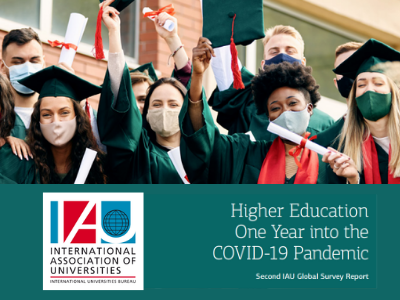Resilient but concerned: read the new findings on how higher education institutions reacted to the pandemic with the second IAU Global Survey Report on the Impact of COVID-19
15 March 2022 | From partners

Story highlights:
– New report introduces a global perspective and a comparison between regions & public vs private HEIs;
– Despite HEI’s resilience, there’s a concern with aggravation of pre-existing inequalities
In February 2022, the International Association of Universities, with whom UNICA is affiliated with, launched the second edition of the global survey on the impact of COVID-19 on higher education to monitor the situation one year into the pandemic.
The survey gathered replies from 496 HEIs in 112 countries and worldwide. This second edition was a comprehensive survey gathering institutional responses in all aspects of higher education mission and functioning, namely, governance, teaching and learning, research and community/societal engagement. The report, Higher Education One Year into the COVID-19 Pandemic, introduces the global perspective and a comparison between regions and public and private HEIs.
The results of the survey illustrate how HEIs have shown resilience during the pandemic. HEIs across
the world have created innovative solutions, have invested extra time and energy to minimize disruption
at a time when the health crisis led to complete or partial closure of campuses in most countries. Yet, this important degree of resilience aside, the picture that is painted in this report is also one of great
concern, one of decreasing financial means, one where a number of students cannot benefit from remote teaching and learning, research activities are delayed and we also see a certain level of decreased
funding, one where staff is overworked, and recruitment is slowing down; and, most importantly, these
challenges hit regions, countries and institutions differently, and with a clear tendency to further
exacerbate pre-existing inequalities.


 Co-funded by the European Union. Views and opinions expressed are however those of the authors only and do not necessarily reflect those of the European Union or the European Education and Culture Executive Agency (EACEA). Neither the European Union nor the granting authority can be held responsible for them.
Co-funded by the European Union. Views and opinions expressed are however those of the authors only and do not necessarily reflect those of the European Union or the European Education and Culture Executive Agency (EACEA). Neither the European Union nor the granting authority can be held responsible for them.